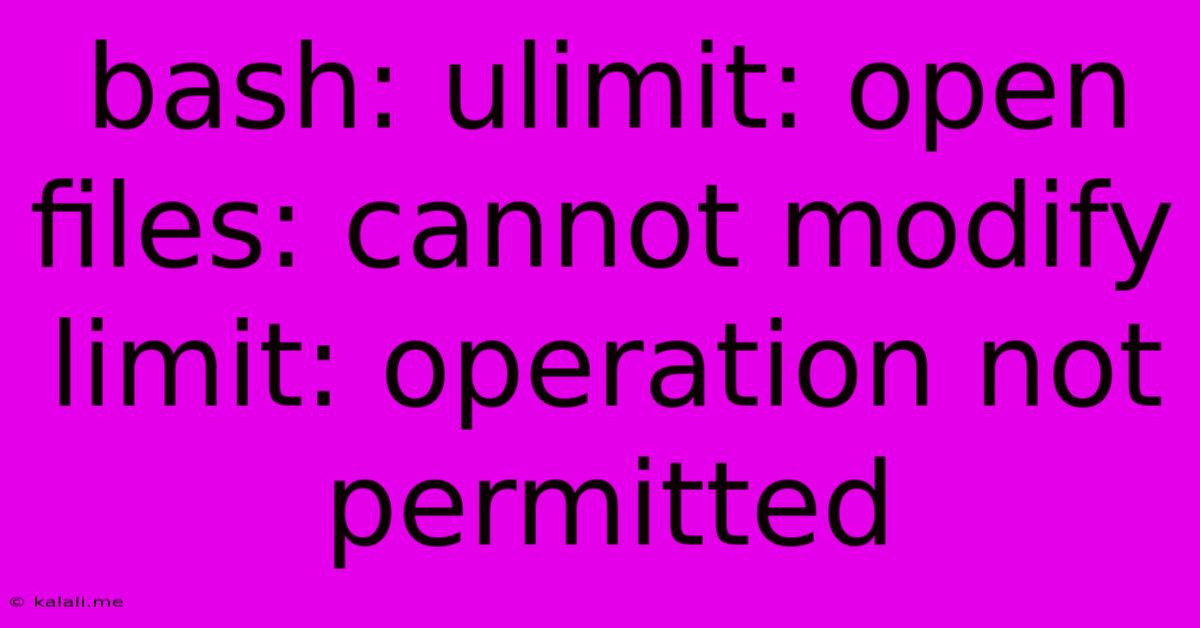Bash: Ulimit: Open Files: Cannot Modify Limit: Operation Not Permitted
Kalali
Jun 04, 2025 · 4 min read

Table of Contents
Bash: ulimit: open files: cannot modify limit: Operation not permitted – A Troubleshooting Guide
This frustrating error message, "bash: ulimit: open files: cannot modify limit: Operation not permitted," pops up when you try to increase the maximum number of open files allowed by your system using the ulimit command. This guide will walk you through the common causes and solutions for this problem, helping you regain control over your system's resource limits. Understanding this issue is crucial for developers, system administrators, and anyone working with processes that require many open files, such as web servers or database connections.
The ulimit command controls various resource limits within a shell, including the number of open files. The "Operation not permitted" error indicates you lack the necessary permissions to modify this specific limit. This is often due to security restrictions or limitations imposed by your system's configuration.
Understanding the Root Cause: Permissions and System Limits
The inability to modify the ulimit value usually stems from one of the following:
-
Insufficient Privileges: You're likely running the
ulimitcommand without root or administrator privileges. The system protects theulimitsettings for security reasons, preventing unauthorized users from modifying system-wide resource usage. -
System-Wide Limits: Even with root privileges, the system itself might impose hard limits that prevent exceeding a certain number of open files. These limits are often set to prevent resource exhaustion and system instability. The
ulimit -Hncommand (where 'n' is the resource, for example, 'n' for open files) shows the hard limit, whileulimit -Snshows the soft limit. The soft limit cannot exceed the hard limit. -
Systemd Restrictions (Linux): In many modern Linux distributions using systemd, resource limits are managed through systemd's unit files. Directly modifying ulimits via the command line may be ineffective if the unit file overrides your changes.
-
Docker Container Limitations (If applicable): If you're working within a Docker container, the container's configuration might restrict the number of open files.
Troubleshooting Steps: Resolving the "Operation not permitted" Error
Here's a step-by-step guide to resolve this issue:
-
Run as Root/Administrator: The most common fix. Use
sudo ulimit -n <number>(replace<number>with your desired limit) to elevate your privileges. This allows you to attempt modifications to the soft limit. Remember to replace<number>with the desired number of open files. -
Check Hard Limits: Use
sudo ulimit -Hnto check the hard limit for open files. If the soft limit (sudo ulimit -Sn) is already set to the hard limit, increasing it will require modifying the hard limit as well. -
Modify Hard Limits (If Necessary): To adjust the hard limit, you'll typically need to edit system configuration files. The location and method vary depending on your operating system:
- Linux (often
/etc/security/limits.conf): Add a line specifying the user, the type of limit, the value, and the relevant resource. For example:
hard nofile soft nofile Replace
<username>with the username and<number>with the desired hard limit. After saving the changes, you might need to log out and back in or reboot for the changes to take effect. You can also use thepam_limitsmodule.- macOS/BSD (often
/etc/launchd.confor usinglaunchctl): The method for adjusting limits on macOS is typically different. You may need to use the system's configuration tools.
- Linux (often
-
Check Systemd Unit Files (Linux): Examine the relevant systemd unit files (e.g., for your web server or database) to see if they explicitly set resource limits. You might need to modify the unit file to adjust the limits appropriately and then restart the service.
-
Docker Container Configuration (If applicable): If you're working within a Docker container, refer to the Docker documentation on how to adjust resource limits for the container. This often involves setting resource limits during container creation.
-
Reboot (If Necessary): After making configuration changes, a system reboot might be necessary to apply the new limits system-wide.
Best Practices for Managing File Limits
-
Start conservatively: Begin with a moderate increase in the file limit and gradually increase it if needed, monitoring system performance.
-
Monitor resource usage: Use system monitoring tools to track the number of open files and other resource usage to avoid overcommitting your system.
-
Regularly review limits: Periodically review and adjust your file limits based on your application's needs and system performance.
By following these steps, you should be able to resolve the "Operation not permitted" error and successfully adjust your system's open file limits. Remember to always proceed cautiously when modifying system-level settings, backing up your configuration files before making changes.
Latest Posts
Latest Posts
-
Signed Pearl Harbor Childrens Book Value
Jun 06, 2025
-
Stardew Does Tiller Work In Multiplayer
Jun 06, 2025
-
I Would Be Please To Chat With You Or
Jun 06, 2025
-
Is It Safe To Make Soucemap Available In Production
Jun 06, 2025
-
Christ In Us The Hope Of Glory
Jun 06, 2025
Related Post
Thank you for visiting our website which covers about Bash: Ulimit: Open Files: Cannot Modify Limit: Operation Not Permitted . We hope the information provided has been useful to you. Feel free to contact us if you have any questions or need further assistance. See you next time and don't miss to bookmark.